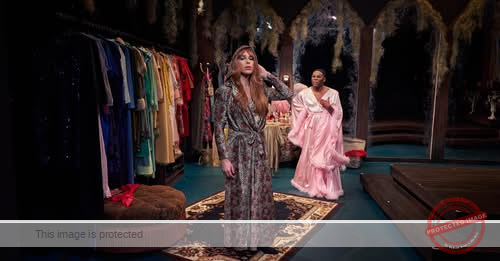
For those of us who lived through the AIDS crisis, “At the Wake of a Dead Drag Queen” triggers too many memories of performances at funerals and wakes, staged in rooms filled with people trying to smile through their tears. For most younger folks, the appearance of a drag queen offers the chance to hoot and holler, to have fun and show some support.
Sitting there at “Wake” on Friday night, I found myself hoping that Terry Guest, the writer-performer behind this world premiere from Story Theatre (in residence at Raven Theatre) would not let the voluminous audience reaction go to his head. Steeped in his own sense of Southern gothic, Guest is a huge Chicago writing talent; I’ve admired his work since I saw “Magnolia Ballet” some three years ago. “At the Wake of a Dead Drag Queen,” which was first produced even before that, could really be something. But that will take more focus and work, and maybe even Guest giving up his starring role.
Guest has said that his 85-minute piece, a two-hander also starring the phenomenal Paul Michael Thomson, was inspired by the death of Guest’s uncle from AIDS at the age of 35. The show is set in 2004, backstage at a small-town Southern establishment where a drag queen named Courtney Berringers (Guest) holds nightly court. Through the narration of this character, whose “government name” is Anthony Knighton, we learn of struggles and aspirations, as you might expect, but Guest also builds a complex picture of one who has built impermeable personal walls of such solidity that he has rendered himself incapable of accepting the support he needs. Even when proffered.
Therein lies the core of this show, as directed by Mikael Burke.
Thomson’s character, a young man named Hunter Grimes, falls in love with his fellow performer. Grimes performs as Vickie Versailles but off stage he focuses mostly on trying to connect with his friend. Since Anthony is Black and Hunter is white, the two debate issues of race and oppression as they change their gowns, both being outsiders in a sometimes cruel town.
In these moments, “Wake” is very moving. It’s fundamentally a piece about friendship and boundaries and you hardly need to perform in drag to recognize its topography. Thomson is credible at every single moment. As vulnerable as he is forceful, this actor inhabits a wounded character who is unafraid to deviate from the drag queen cultural gospel, not all of which he even knows. We intuit that Hunter has figured out that love is the only means to salvation.
Truly, Thomson’s work as the second banana in this show is one of the best pieces of acting I’ve seen this year in Chicago. As his friend spirals downwards, this character keeps calling and calling. To say that the audience becomes invested in this relationship is to understate. Burke, the very capable director, clearly focused there.
Guest is very potent and entertaining, don’t get me wrong, although I think if he stepped out of the show for a while in favor of one of Chicago’s many professional drag queens with top-shelf lip synching skills, he’d be better able to see what it now needs. That’s mostly specificity: Of performance, of theme, of time and of location. Ideally, we’d have a better sense of how the performance space separates from the backstage areas and of what a small-town Southern drag club really looked, felt and sounded like in 2004. The set here, from Alyssa Mohn, is rich in symbolism but I found myself wondering about who and what went where and why.
To my mind, the flashback structure also needs more clarity and although Guest clearly started down the road of using the drag performances to mirror the relationship we are watching unspool, it could go much further for a greater sense of unity; as of now, the musical numbers live somewhat uneasily within the whole, lacking the snaps and pops of climaxes.
The show is already attracting and exciting an audience; the remaining challenge, which could make this a show that could live long here in Chicago or even off-Broadway, is to raise the emotional stakes and yet better honor those artists who lived, worked, and sometimes died, all too young, long before RuPaul.
